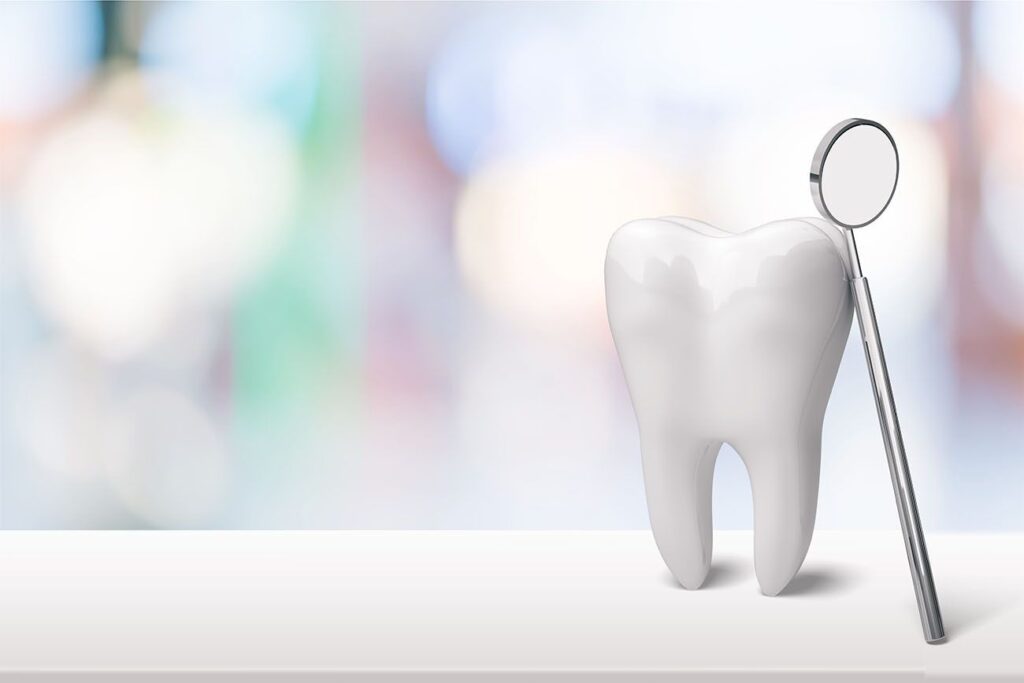For many of us, a steaming cup of coffee is the perfect way to kick-start the day. However, if you’ve ever winced in pain while sipping your favorite brew, you might be experiencing tooth sensitivity. Unfortunately for us coffee lovers, there is a connection between coffee and tooth sensitivity.
Don’t despair! You can enjoy your coffee without discomfort in many ways.

What Causes Tooth Sensitivity?
To understand tooth sensitivity, it’s helpful to know a bit about tooth anatomy. Our teeth have a protective outer layer called enamel. This shields the sensitive inner layers, including dentin and pulp.
When this enamel wears down or becomes damaged, it exposes the dentin that has tiny tubules that lead to the nerves inside the tooth. This allows sensations like heat from coffee to travel further into your tooth and cause pain.
So, how does coffee come into play? Coffee is naturally acidic, and acidity can contribute to enamel erosion. When the enamel wears away, the dentin becomes more exposed, leading to increased sensitivity. Additionally, coffee contains tannins. These compound the staining potential and worsen sensitivity.
Understanding Tooth Sensitivity
Tooth sensitivity manifests as a sharp, sudden pain or discomfort when teeth are exposed to certain stimuli, such as hot, cold, sweet, or acidic foods and beverages. If you experience a twinge of pain when sipping your morning coffee or biting into an ice cream cone, you might have tooth sensitivity.
Tips for Enjoying Coffee with Sensitivity
While you don’t have to give up your beloved coffee entirely, there are steps you can take to minimize discomfort:
- Use a Straw: Drinking coffee through a straw can help bypass direct contact with your teeth. This can reduce your exposure to enamel-eroding acids.
- Limit Coffee: Consider reducing the frequency of coffee consumption or opting for smaller servings to lessen the impact on your teeth.
- Rinse with Water: After enjoying your coffee, rinse your mouth with water to help neutralize acids and wash away any residue.
- Avoid Brushing Immediately: Wait at least 30 minutes after consuming coffee before brushing your teeth. This allows the enamel to remineralize and reduces the risk of abrasion.
- Choose a Low-Abrasive Toothpaste: Look for toothpaste designed for sensitive teeth. These contain ingredients that help block the tubules in the dentin, reducing sensitivity.
Protecting Your Tooth Enamel
Aside from modifying your coffee habits, it’s crucial to protect your tooth enamel to prevent further sensitivity. Here are some tips:
- Good Oral Hygiene: Brush your teeth twice a day with fluoride toothpaste, and floss daily to remove plaque and prevent decay.
- Use a Soft-Bristled Toothbrush: A soft-bristled brush is gentle on enamel and less likely to cause abrasion.
- Wear a Night Guard: If you grind your teeth at night, a night guard can also protect your enamel from damage.
When to See Your Dentist
If you’re experiencing persistent tooth sensitivity, it’s essential to see your dentist. They can determine the underlying cause and also recommend appropriate treatment. In some cases, sensitivity may be a sign of a more serious dental issue, such as tooth decay or gum disease.
Understanding Coffee’s Effects on Tooth Enamel
Coffee doesn’t just stain teeth. Its acidity can also weaken tooth enamel over time. With an average pH level of 5, coffee falls into the acidic range, which can gradually soften and wear down enamel.
However, not all coffee affects teeth the same way. Cold brew tends to be less acidic than hot coffee, and dark roasts are typically gentler on teeth than light roasts.
Adding milk can help counteract some of the acidity, since dairy contains proteins and calcium that neutralize acidic compounds. By paying attention to brewing methods and additives, coffee drinkers can enjoy their daily cup while reducing the risk of enamel erosion.
Why Tooth Sensitivity Varies During the Day
Many people notice their teeth feel more sensitive at certain times, especially in the morning. This happens because saliva production slows down overnight, leaving teeth with less natural protection. Additionally, gum tissue swells slightly during sleep, which can expose more of the tooth’s root surface.
As the day continues and saliva flow increases, teeth become less sensitive. This explains why that first cup of coffee in the morning often causes the most discomfort. To minimize sensitivity, waiting an hour after waking before drinking coffee can help, as can using sensitivity toothpaste before bed to strengthen enamel overnight.
Lower-Acid Coffee Alternatives for Sensitive Teeth
For coffee lovers with sensitive teeth, there are ways to enjoy coffee without as much enamel damage. Mushroom coffee, though it has a unique taste, contains natural compounds that reduce acidity. Chicory root coffee offers a similar roasted flavor with less risk to teeth. Some coffee brands now sell specially processed low-acid varieties, which can be easier on enamel.
For those who prefer traditional coffee, choosing arabica beans over robusta (which has nearly double the acidity) or brewing with alkaline water can make a difference. With these alternatives, even people with sensitive teeth can still enjoy coffee without as much discomfort or long-term damage.
